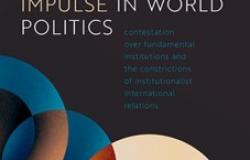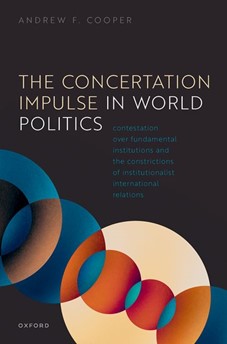Book Review - The Concertation Impulse in World Politics: Contestation over Fundamental Institutions and the Constrictions of Institutionalist International Relations

The Concertation Impulse in World Politics: Contestation over Fundamental Institutions and the Constrictions of Institutionalist International Relations by Andrew F Cooper. Oxford: Oxford University Press 2024. 400 pp., £108 hardcover 9780198897507
Major global policy debates revolve around efforts to improve international institutions aimed at managing various global challenges. Currently, there is a crisis of collective action at the global level, with growing tensions among major powers, and the rise of informal institutions is altering traditional governance patterns. The stakes of ensuring that the institutionalist international relations (IR) research program has solid foundations and asks the right questions are particularly high.
Andrew F. Cooper’s book, “The Concertation Impulse in World Politics,” is a timely, compelling, and comprehensive response to this moment. It questions “whether the impulse towards concertation can be considered not just a foundational institutional format looking backwards to the nineteenth century but a fundamental institution in the context of the twentieth and twenty-first centuries” (p. 29). Concertation combines “a self-selected form of bounded membership, a focus to some degree on the workings of central management of world politics, and a punctuated ethos of informality” (p. X). It gets “animated by a recurrent impulse” as pivotal countries respond to international crises by promoting informal institutional formats (p.3).
 Cooper critiques institutionalist, especially rationalist IR, for privileging formal multilateral international organizations as pillars of the international system while overlooking the contestation over institutional design and the resilience of a concert model. Drawing on Hedley Bull’s contributions, he highlights areas where mainstream IR is lacking and seeks to reframe the debate. He argues that international crises are a “master gap” in scholarship that privileges order over disorder (p.16, Ch. 3). He notes a “normative gap” where institutions are seen as neutral sites (p. 16-7, Ch. 4), and a “convenience gap” where stability is emphasized, often inflating U.S. commitment to formal multilateralism (p. 18, Ch. 5). Additionally, he observes the lack of attention given to a non-Western majority (p. 19, Ch. 6).
Cooper critiques institutionalist, especially rationalist IR, for privileging formal multilateral international organizations as pillars of the international system while overlooking the contestation over institutional design and the resilience of a concert model. Drawing on Hedley Bull’s contributions, he highlights areas where mainstream IR is lacking and seeks to reframe the debate. He argues that international crises are a “master gap” in scholarship that privileges order over disorder (p.16, Ch. 3). He notes a “normative gap” where institutions are seen as neutral sites (p. 16-7, Ch. 4), and a “convenience gap” where stability is emphasized, often inflating U.S. commitment to formal multilateralism (p. 18, Ch. 5). Additionally, he observes the lack of attention given to a non-Western majority (p. 19, Ch. 6).
The book convincingly demonstrates how a concertation-focused approach can capture the differentiation of lived experience within the international system and the impact of crises as drivers of institutional transformation. Cooper finds that concertation is indeed a patterned action, and its attraction – “whether in its classical form or in modified format through plurilateral summitry” is that it responds to “impulse to manage crises and reassert stability though hierarchical means” (p. 322). He explores how concertation has evolved over time, prioritizing co-existence and pragmatic cooperation among both like-minded and diverse states.
The concert model’s hierarchical privileges and collective hegemony of great powers over weaker ones are contrasted with formal multilateralism, which is considered universal and a safeguard against arbitrariness. Therefore, non-Western countries have deeply distrusted concerts, but, as Cooper demonstrates, their designs have also advanced. G7 is a “pivotal illustration” of the morphing of the concert model via club concert-like governance (p. 45). However, problematic engagements with Russia, China and India, reinforced non-Western states’ concerns (p. 104-6, 167). Then, the 2008 Global Financial Crisis paved the way for the evolution of G20 as a pluralist concert-like sustained initiative, but aspiring powers remained torn between status seeking and solidarity with the Global South (Ch. 7-8). Trump’s personalist-populist agenda revitalized the shallow concert model, demonstrating the boundaries of concert power (Ch. 9). In parallel, BRICS has sought to counter Western institutional dominance, building up “a collective institutional personality, the full implications of which still lie ahead” (p. 304).
“The Concertation Impulse in World Politics” is innovative on several fronts. It challenges the conventional image of global governance as a system composed of formal organizations and other, less palpable forms of cooperation. Cooper provides an original theoretical account of concertation, elevating informal institutionalism to a central focus in IR history and theory. Cooper’s integration of various strands of informal governance, along with his treatment of its normative dimension, constitutes another major contribution to the field of IR. It is especially relevant because despite the increasing prominence of informal governance, scholarly research in informal institutionalism has been limited and fragmented. Additionally, the in-depth exploration of concertation serves as an important counterpoint to the informal intergovernmental organization agenda, which analyzes major informal groups as similar “formal organization light” designs rather than evolved forms of coalition-like structures.
Cooper’s emphasis on agency (“who”) and diplomacy (“how”) in the design process effectively leverages the strengths of the English School, enhancing our understanding of institutional choices and the emergence of state-based plurilateralism. With the rapid evolution of non-Western agency and debates on global governance reforms, his efforts to insert designers into institutional design provide opportunities to explore how concertation can include those traditionally excluded. Checking the narrative is the first step. He argues that non-Western countries should not be stereotyped as either adhering to universalist rules or disrupting the system, given the disruptive role of incumbents (especially the US), while non-incumbents from the Global South act as “conservatives” (p. 312).
Overall, this is an ambitious and complex book with nuanced reflections: Cooper criticizes rationalist institutionalism but acknowledges its systematic and scientific analysis of institutional design. He elevates concertation while addressing its drawbacks and legitimacy concerns from various perspectives. To complete this nuanced approach, theoretically investigating and elaborating on the IBSA (India-Brazil-South Africa) group would sharpen the argument. IBSA embodies non-Western institutional entrepreneurship, providing insights into the capture and release of the concertation impulse, and the identification of structurally important states in the collective management model.
The case for concertation certainly means going “back to basics” in terms of the concert model and tracing its evolution over time. However, arguing that concertation represents a “fundamental institution” in the 21st century is theoretically more demanding. The book acknowledges complexity literature but does not conceptualize informal groups like G20 or BRICS as informal institutional complexes. Yet these entities consist of nested, smaller state-led informal groups, influencing state motivations and the scope of concertation (e.g., p. 83 for G20). As complexity scholars grapple with defining their unit of analysis (e.g., introducing regime/institutional/global governance/hybrid and other complexes), what can be isolated as fundamental remains an open question.
In terms of developing the concertation research agenda in the future, is it crucial to focus on distinguishing institutional design along the formal multilateralism vs. informal lines? Can the concertation argument deliver if this rivalry is not “the crux of the contest” (p. 305)? While Cooper clearly acknowledges that the contest between formality and informality is not binary (p. 4), the “ethos of informality” is increasingly complicated in practice. Pivotal states turn to informal groups within formal bodies (e.g. negotiating the Paris agreement), and informal groups create formal organizations (such as the BRICS-led New Development Bank). Notwithstanding (in)formality, the crises of climate and hegemony can still trigger concertation, activating self-selected groups with central management aspirations, while using compensatory layering, community building, and other institutional transformation mechanisms.
With its impressive theoretical richness and a fresh perspective on mainstream IR debates, this book opens many exciting pathways for future research. It is particularly valuable to IR scholars pursuing theory development and those interested in understanding informal institutions within IR. Policy enthusiasts will appreciate an inside view of agency and contestation in premier informal groups that are rarely discussed together. Moreover, the broader importance of this book lies in advancing the study of institutional entrepreneurship within and beyond IR, which is crucial for creating more effective and just global governance.
Mihaela Papa, Ph.D., is Senior Fellow, Rising Power Alliances project at the Fletcher School of Law and Diplomacy at Tufts University.


